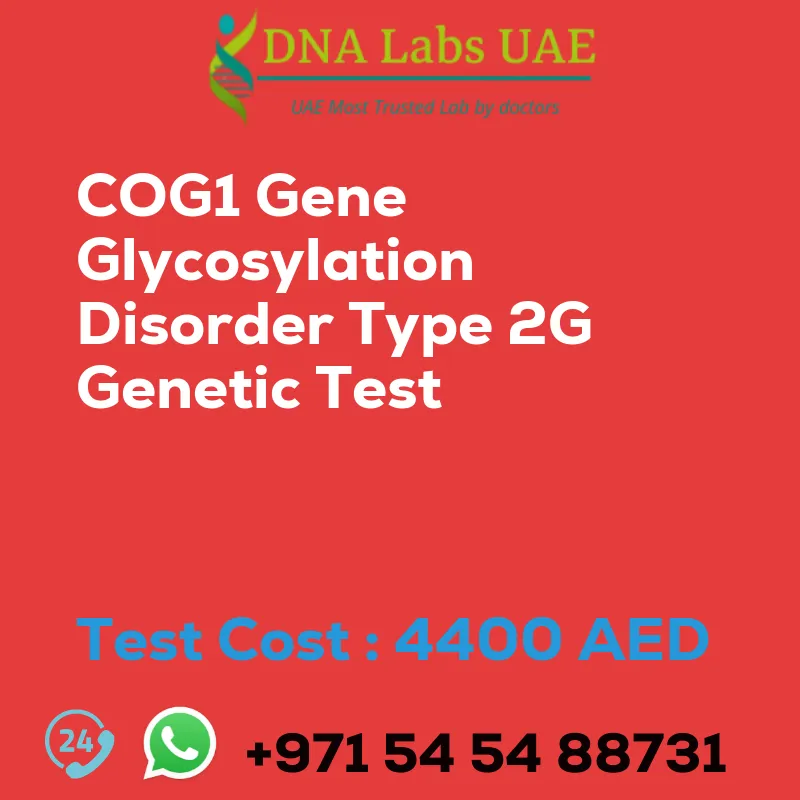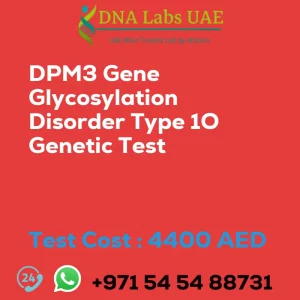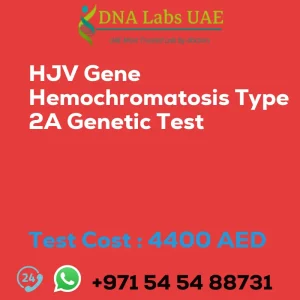COG1 Gene Glycosylation disorder type 2G Genetic Test
At DNA Labs UAE, we offer the COG1 Gene Glycosylation disorder type 2G Genetic Test to help diagnose individuals with suspected glycosylation disorders. This genetic test detects mutations or variations in the COG1 gene, which is responsible for the production of a protein involved in the glycosylation process.
Test Details
The COG1 gene glycosylation disorder type 2G NGS genetic test uses Next-Generation Sequencing (NGS) technology to analyze the entire coding region of the COG1 gene. This allows for the simultaneous analysis of multiple genes and provides a comprehensive evaluation of genetic variations or mutations.
Glycosylation is a crucial process in which sugar molecules are attached to proteins or lipids, forming glycoproteins or glycolipids. It plays a vital role in various cellular processes, including cell signaling, protein folding, and cell adhesion. Mutations in the COG1 gene can disrupt the glycosylation process, leading to the development of glycosylation disorder type 2G.
Symptoms and Diagnosis
Glycosylation disorder type 2G can cause a wide range of symptoms, including developmental delays, intellectual disabilities, skeletal abnormalities, and organ dysfunction. To diagnose this disorder, a clinical history of the patient is taken, and a genetic counseling session is conducted to draw a pedigree chart of family members affected by glycosylation disorder type 2G.
Test Components and Price
The COG1 Gene Glycosylation disorder type 2G Genetic Test is priced at 4400.0 AED. The test requires a blood sample or extracted DNA, or one drop of blood on an FTA card.
Report Delivery and Test Department
After the sample is collected, the report will be delivered within 3 to 4 weeks. The COG1 Gene Glycosylation disorder type 2G Genetic Test is conducted in our Genetics test department.
Test Type and Doctor
The COG1 Gene Glycosylation disorder type 2G Genetic Test falls under the category of Metabolic Disorders. It is recommended to consult with a General Physician for this test.
Conclusion
The COG1 Gene Glycosylation disorder type 2G Genetic Test offered by DNA Labs UAE is a valuable tool for diagnosing individuals with suspected glycosylation disorders. It provides important information for genetic counseling and the management of this condition. Additionally, it contributes to ongoing research and the development of potential therapies for glycosylation disorders.
| Test Name | COG1 Gene Glycosylation disorder type 2G Genetic Test |
|---|---|
| Components | |
| Price | 4400.0 AED |
| Sample Condition | Blood or Extracted DNA or One drop Blood on FTA Card |
| Report Delivery | 3 to 4 Weeks |
| Method | NGS Technology |
| Test type | Metabolic Disorders |
| Doctor | General Physician |
| Test Department: | Genetics |
| Pre Test Information | Clinical History of Patient who is going for COG1 Gene Glycosylation disorder type 2G NGS Genetic DNA Test A Genetic Counselling session to draw a pedigree chart of family members affected with Glycosylation disorder type 2G |
| Test Details |
COG1 gene glycosylation disorder type 2G NGS genetic test is a type of genetic test that is used to detect mutations or variations in the COG1 gene. This gene is responsible for providing instructions for the production of a protein involved in the process of glycosylation. Glycosylation is a process in which sugar molecules are attached to proteins or lipids, forming glycoproteins or glycolipids. This process is crucial for the proper functioning of various cellular processes, including cell signaling, protein folding, and cell adhesion. Mutations in the COG1 gene can disrupt the glycosylation process, leading to a glycosylation disorder known as type 2G. This disorder can result in a wide range of symptoms, including developmental delays, intellectual disabilities, skeletal abnormalities, and organ dysfunction. The NGS (Next-Generation Sequencing) technique is used in this genetic test to analyze the entire coding region of the COG1 gene. It allows for the simultaneous analysis of multiple genes and can provide a comprehensive evaluation of genetic variations or mutations. The COG1 gene glycosylation disorder type 2G NGS genetic test can help in diagnosing individuals with suspected glycosylation disorders and can provide valuable information for genetic counseling and management of the condition. It can also aid in understanding the underlying genetic causes of the disorder and contribute to ongoing research and development of potential therapies. |








